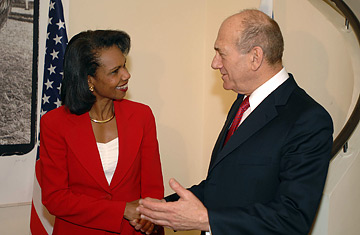
US Secretary of State Condoleezza Rice meets with Israeli Prime Minster Ehud Olmert at his residence in Jerusalem.
At a Jerusalem banquet Sunday night with Secretary of State Condoleezza Rice and ex-British Prime Minister Tony Blair, it was easy to forget that the garrulous host, Israeli Prime Minister Ehud Olmert, was beset by a low popularity rating, sniping coalition partners and an army that ignores him. In his baritone voice, the Israeli Premier boomed, "This is the time to act. We must be prepared to take risks."
For Olmert's dinner guests, it was a surprising display of bravado. In the Middle East, risk is synonymous with compromise. And for the upcoming U.S.-sponsored peace summit in Annapolis to succeed, both Olmert and Palestinian President Mahmoud Abbas would have to be ready to take substantial risks. Until now, Olmert and Abbas have proven to be decidedly risk-averse.
But on Rice's eighth visit to the region to promote a new peace accord, the Secretary may have achieved something of a breakthrough. Both Olmert and Abbas are certainly talking the talk of reaching an accord at Annapolis. But what would such an agreement look like? And could either leader sell it to his own people, for whom any concession might be seen as betrayal?
Most likely, Olmert and Abbas are simply making the noises they know will please Rice and her boss in the White House. After so many visits made by the Secretary, the Palestinians and the Israelis have fine-tuned their sensitivities to what she wants — and telling Rice that she and Bush could leave office in mid-2008 with a Middle East peace plan nicely wrapped up is exactly what she wants to hear.
Right now, of course, Rice would probably settle for a more modest goal: simply getting Israelis and Palestinians on board a plane to Annapolis. That will probably happen, barring an outbreak of violence, since neither the Israelis nor the Palestinians want to risk Washington's ire by refusing to go. After Rice met on Monday with Abbas, one Palestinian negotiator commented: "The Americans are focusing more on having this conference than on the actual results."
Coaxing Olmert and Abbas to the summit may be hard enough for Rice, but striking a peace deal within the waning months of Bush's term may prove impossible. To satisfy the Israelis, Abbas has to give Olmert a guarantee that he can stop Palestinian militants from exploding suicide bombs and firing rockets from Gaza — which Abbas cannot do, since Gaza is under the control of Abbas' rivals, the Islamist militants of Hamas. He is also being tugged two ways — by the U.S., which wants him to keep Hamas quarantined in Gaza, and by the Saudis, who are urging Abbas to patch up with the Islamic militants. Olmert has to persuade the Palestinians that he is serious about a two-state solution by freezing work on the Jewish settlements outside Israel's 1967 borders and by cutting back on the Israeli military presence in the West Bank. And that's just for starters, the confidence-building steps in a process the Palestinians need to conclude with their flag flying over East Jerusalem.
Abbas, is trying to build a reliable security force with training and funds from the Bush Administration, and he has already deployed some of it on the streets of Nablus, the largest town in the West Bank. The goal is to have the cops replace the gunmen who have ruled these towns, and who sporadically attack targets inside Israel. Training has only just begun, so it's too early to tell if these police are willing to crack down on their former comrades in the anti-Israel resistance. And even if Abbas' American-trained cops are successful in disarming militants in the West Bank, Gaza is still beyond their control.
Even within the ranks of Abbas' own Fatah movement, there is growing opposition to attending Annapolis. One senior Fatah official who is advising Abbas not to go to the summit said: "We Palestinians will be blamed if nothing is achieved."
Meanwhile, in Jerusalem, Olmert faces troubles of his own. Government sources have told TIME the Prime Minister is furious, but helpless, when the army simply ignores his orders and prevents him from keeping the promises made to Abbas and Rice to dismantle checkpoints inside the West Bank. There is talk of a goodwill gesture by the Israelis before Annapolis, in which Olmert may release up to 2,000 Palestinian prisoners — they are being arrested at the rate of 5 to 15 a day, say human rights activists. But ministers inside his wobbly coalition have warned Olmert that the release of any Palestinians will bring down the government.
Rice's role in shuttling between the Israelis and the Palestinians has been to minimize the mutual suspicion, born of violence and broken vows. It's a near impossible task. As one Palestinian official close to Abbas remarked: "The gap between us is still deep, and we don't feel that the U.S. is putting any pressure on Israel."
Despite these obstacles, both Abbas and Olmert say that a final settlement could be worked out before Bush leaves office. So they're talking the talk. But it won't be until the Annapolis summit actually takes place, sometime in late November or early December, that Rice will know if Olmert and Abbas are prepared to walk the walk.
— With reporting by Jamil Hamad/Bethlehem and Aaron J.Klein/Jerusalem
